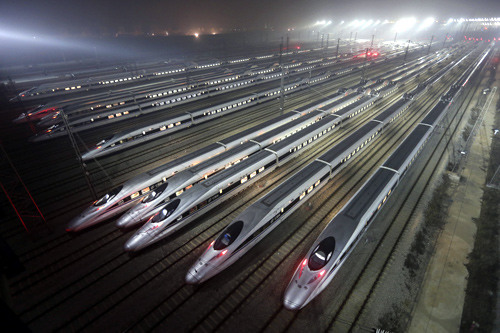An old saying goes, "the trains always run on-time in Germany," which defines the nation's spirit that favors schedules, precision and technical expertise above all else. While in recent years, China's train industry has achieved remarkable results; introducing more-advanced technologies to the market.
Accordingly, Germany's largest state-owned railways corporation, Deutsche Bahn AG (DB) plans to open its first international procurement office in Shanghai.

"Especially for large orders for our trains and locomotives, we are looking at the worldwide procurement markets, Uwe Guenther, DB's chief procurement officer, told Xinhua news agency. "We would like to have the best supplier and partner."
Deutsche Bahn hinted it would purchase rail vehicle replacement parts and infrastructure materials from Chinese manufacturers.
Sino-German rail tech partnerships
More German rail experts are praising China's train technology upgrades. A prominent railways industry professor, Peter Munich of Technical University of Berlin spoke with China Radio International. He touted Chinese Premier Li Keqiang as "lead salesman" for the domestic rail sector.
Nevertheless, it's challenging to promote Chinese rail technology to Europe on account of linguistic and cultural differences, as well as various technical and safety standards. The best method would be to hire locally.
"Chinese companies can find a German partner by buying shares or acquiring German companies and employing local technicians so they can participate in the bidding process," said Munich.
Chinese railways companies have taken note and are making big forays with German firms.
Faster & faster trains
China's rail industry has focused efficiency, along with accelerating train speeds over long distances, which stand out as crucial reasons for Germany to seek further rail-tech collaboration with China.
Beijing-based CRRC (China Railways Rolling-stock Corporation), the country's largest train manufacturer, has designed a new 690-kilowatt traction system for bullet trains to travel at speeds exceeding 310 miles-per-hour (500-km/hr).
R&D (research and development) started in 2003 at the Zhuzhou Institute in China's Hunan Province, led by Ding Rongjun of the Chinese Academy of Engineering.
"Now, we have our own permanent magnet synchronous traction system with full intellectual property rights," Ding told International Business Times. "Marking a new chapter in China's high-speed railways."
Plans are underway to equip all Chinese high-speed trains with the new system.
All aboard China-Germany cargo trains
Along with faster trains, China's railways are coordinating with Beijing's 'Belt & Road' initiative to build up infrastructure, trade and investment networks throughout Asia, Africa and Europe.
China has constructed the world's longest rail tracks that run from China's eastern coast to Madrid, Spain. China and Germany have also opened up cargo freight services running between both countries.
Chinese President Xi Jinping visited Duisburg, Germany last year. The city holds the world's biggest inland harbor and serves as a European logistics and transport hub. The two nations then launched Chongqing-Xinjiang-Europe International Railways.
The cargo train operates from southwest China's Chongqing Municipality to deliver and receive goods going to and from Duisburg. The trip reduces the routine 5-weeks shipping time to two weeks and costs over 80 percent less than air freight.
Chinese trains capture German hearts
China's railways continue to impress the world and Germany has played a greater role to collaborate on its rail-tech upgrades. The Chinese and Germans have similar personality traits, they are hard-working and diligent with a scientific outlook on their jobs.
While the two nations work together, we can anticipate the rail networks to roll out even more earth-shattering innovations on a grander scale.
By Tom McGregor, CNTV Commentator


















































